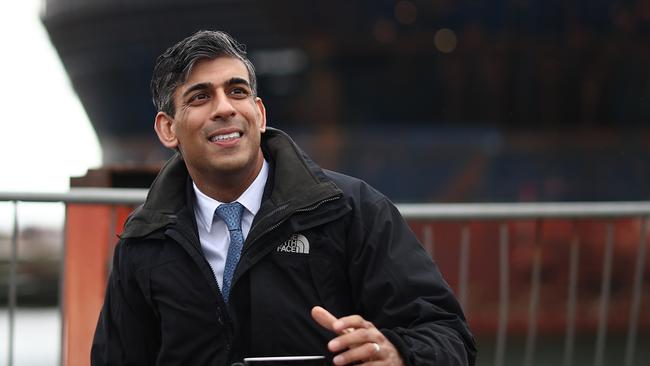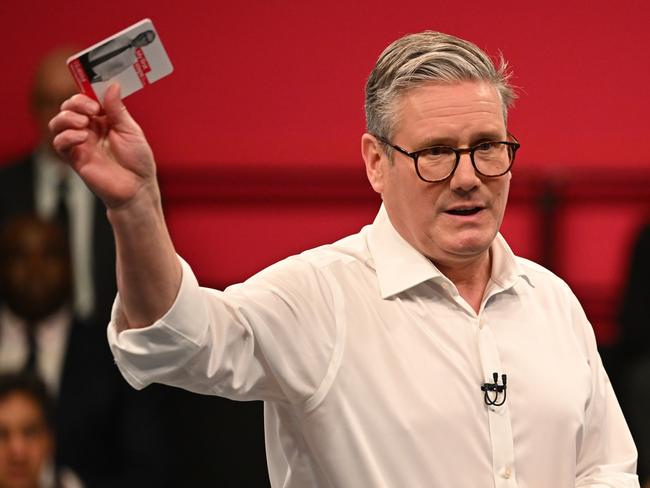
But Starmer, unlike Blair and Wilson, has a charisma deficit. He often comes across as wooden and stilted. His interactions with voters can be awkward. He is more managerial than inspirational, and a bit boring. His favourability rating is just 34 per cent. And as a leader, he arouses little excitement.
Blair was a phenomenon who modernised Labour’s philosophy and structures, developed a program that laid out a vision for a “New Britain” and sold it with charisma and style. Wilson, too, was a multiple election winner who combined intellect with often shrewd political judgment.
Nor does he remind us of Jim Callaghan, known as “Sunny Jim”.


Maybe Starmer is more like the reserved and restrained Clement Attlee who won a landslide victory in 1945, crushing Winston Churchill’s wartime government and blazing a trail of reform with steely resolve. Gordon Brown, who last led Labour in government, was also understated and almost managed to hang on in minority government after the 2010 election.
At 61, Starmer is not a youthful leader. Nor is he a political veteran with years of ministerial experience, like many Labour predecessors. He was elected to the House of Commons only in 2015. Before that he was a lawyer, with a focus on human rights, and Director of Public Prosecutions. He was named after Keir Hardie – the Scottish trade unionist and a founder of the Labour Party – and, unusually for a Labour leader, knighted before he was in parliament.
Prime Minister Rishi Sunak will argue that at a time of challenge at home with the economy struggling and cost-of-living concerns the main issue for voters – and fears over immigration and refugees, coupled with uncertainty in the Asia-Pacific and conflict in the Middle East and Europe – now is not the time to change, especially as Starmer is untested and untried.
Yet Starmer should not be underestimated. As Labour leader since 2020, he showed determination in removing Jeremy Corbyn and abandoning his retrograde agenda. Starmer has remade Labour. He insisted on control over the selection of candidates and the party organisation, alongside policy development. He has also reached out to Blair and Brown, bringing them back into the fold.

Corbyn was brutally bad for Labour. He was a throwback to the ultra-left within Labour, and while he initially had some populist appeal with his Marxist economic policies such as nationalisation of private companies, anti-Semitism and fondness for autocrats and terrorists, he was never going to be prime minister. That was clear at the 2019 election when Labor’s vote plummeted to 32 per cent and the party lost 60 seats. Corbyn almost destroyed Labour.
Starmer is a moderate political leader. He is not a radical but he would be to the left of Blair and Brown. He promises no revolution but pragmatism and safe change. He is focused on addressing cost of living issues, rebuilding public services, tackling crime, and bringing economic and political stability back to Britain. He talks about national renewal and arresting decline. And he insists “the Labour Party has changed”.

Some internal party critics say his agenda is not ambitious and reformist enough. Managing internal differences will be a challenge. In seeking the centre ground, he has tried to woo business without alienating unions. Business leaders are reportedly not concerned about Labour being anti-business. Shadow chancellor Rachel Reeves has pledged lower business taxes, not to increase borrowings and manage the budget according to strict fiscal rules. But Starmer and Reeves have committed to increasing taxes on private schools to help fund some pledges.
The question that will be answered on July 4 is whether Starmer can appeal to a broad cross section of voters, as all Labour leaders must do, to the rebuild the so-called red wall in northern England and the Midlands where the party has lost seats, and also gain Conservative seats in southern and middle England. This is the path back to power.
When I interviewed Blair in London last year, he praised Starmer for saving Labour from extinction and predicted he would lead the party to victory. “Starmer, to be fair, has done a great job in pulling the Labour Party back from the madness of the Corbyn years,” Blair said. “He’s pulled it from being on the brink of going out of existence to being on the brink of government.”
Labour’s polling lead over the Conservatives is about the same as it was in 1997 when Blair routed John Major’s government – 20-plus points – and it would require a political miracle for Sunak to turn it around. The fifth prime minister in 14 years shows no sign of doing so. Indeed, Labour’s poll dominance has been sustained for years, suggesting voters are ready for a change of government.
There is a chance, though, given Labour’s likelihood of victory, that some voters may decide to stick with the Conservatives or cast their vote for a minor party such as the Liberal Democrats or Greens, feeling it is safe to do so given Starmer will cross the threshold into No.10 anyway – so a minority parliament cannot be ruled out.
The risk is that Starmer will not excite enough people to cast their votes for Labour. But then again, after the chaos, drama and decade-plus of revolving-door Tory prime ministers, maybe Brits will be satisfied with a serious and sober leader who lacks the razzle and dazzle of past Labour leaders.







If the opinion polls are correct – we know they can be wrong – Sir Keir Starmer will be the next British prime minister and only the third Labour leader to take the party from opposition into government in the past 50 years, after Tony Blair (1997) and Harold Wilson (1974). And he will do so with a landslide victory.